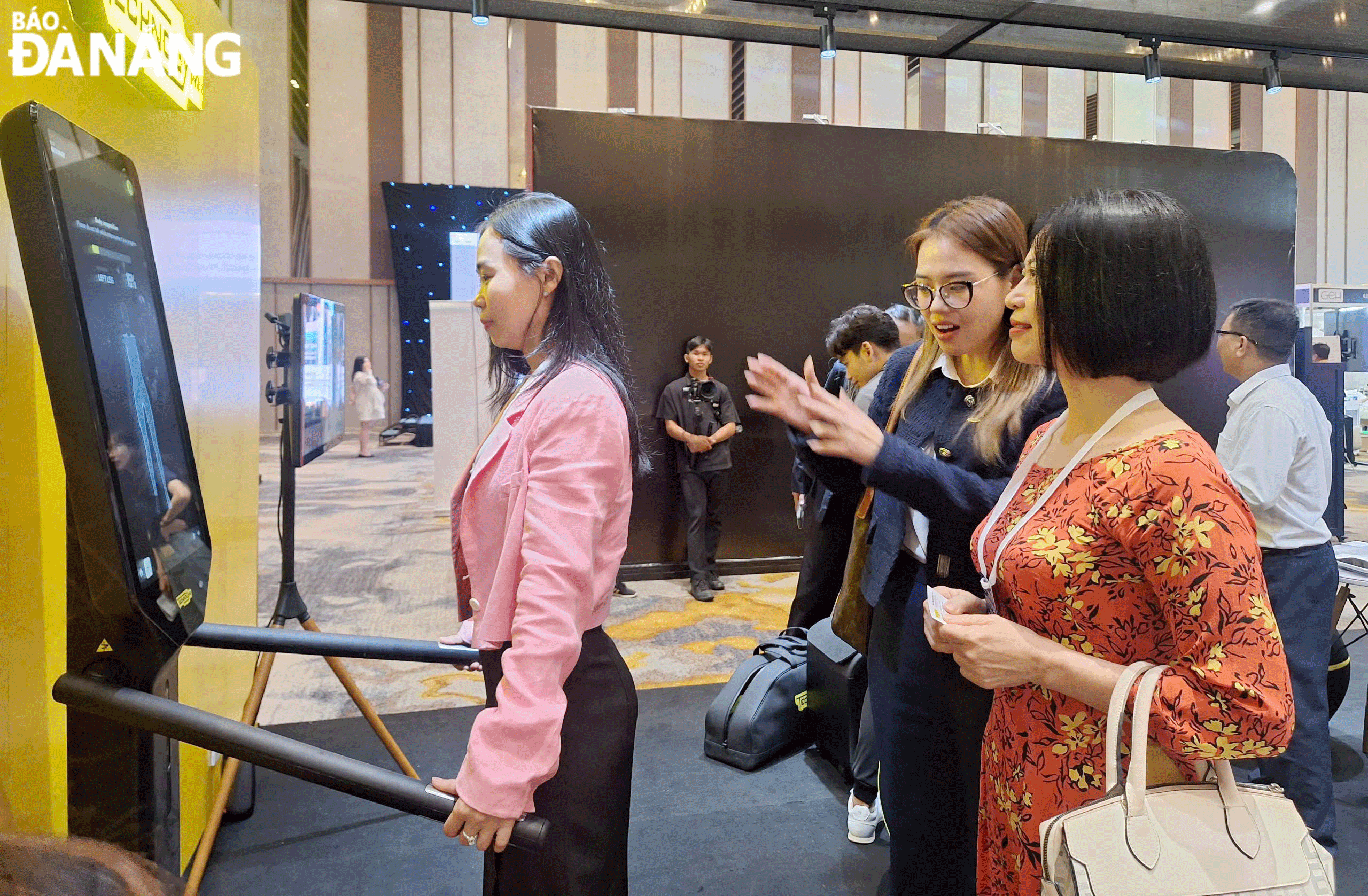Boosting technological applications to develop sustainable tourism
Adapting to the general trend, in recent times, accommodation establishments and tourism service businesses have quickly and flexibly applied the support of technology to shopping and customer service activities. Digital transformation and integration of modern tourism technology have opened up many opportunities, helping the tourism and service industries to develop and increase convenience.
 |
| Tourists experience the usage of a health care device. Photo: THU HA |
In operation for more than eight months, Maha Vegetariano vegetarian restaurant on Nguyen Xuan Khoat Street, Son Tra has gradually become a familiar destination for many international guests such as Japan and India.
Ms. Ngoc Ha, the owner of Maha Vegetariano vegetarian restaurant, said that each brick and decorative objects at the restaurant were selected from traditional craft villages in Thanh Ha pottery village (Quang Nam), Bau Truc (Ninh Thuan) and Bat Trang (Ha Noi), the mascots and reliefs displayed in the restaurant are also modeled after Champa culture.
“Many international visitors who come to use the service want to learn about the origin of the reliefs displayed at the restaurant, so we are connecting with experts from the Da Nang Museum of Cham Sculpture to get accurate information about the origin, history and culture of the reliefs, then placing QR codes in different languages so that guests can learn more about the unique Cham culture. In addition, the restaurant also has a QR code menu and electronic payments to bring personalised convenience to the service experience of visitors,” said Ms. Ngoc Ha.
Head of the Editorial Board of Epicure Viet Nam Culinary Magazine, Ms. Tracie May Wagner, said that online payment platforms (MoMo, ZaloPay and ApplePay) are currently used throughout Viet Nam, from small street vendors to large restaurant chains, allowing residents and visitors to make transactions quickly and safely.
Digital payments help reduce risks associated with handling cash and improve accuracy, with transactions recorded automatically for easier financial tracking. In addition to constantly improving technology, many transportation and service businesses have invested in improving service quality and operations at airports, train stations, and bus stations, as well as providing safe, reliable, and convenient travel services for tourists.
In fact, the application of technology has helped a lot in the tourism service industry. The city’s tourism industry also focuses on many issues of technology development to bring convenience to tourists and residents, aiming at sustainable and responsible tourism development.
At the event ‘Horecfex Viet Nam 2024, the first and largest event on tourism technology held in Da Nang, tourism service businesses and tourists visited and experienced the latest equipment and applications in the tourism industry such as service robots, health care technology and sales applications.
Exhibition attendees admired service robots in hotels. Based on available programming, robots can bring food, drinks and utensils to requested locations. Robots have sensors so they can navigate their way and automatically avoid obstacles.
According to Chairman of the Da Nang Hotel Association Nguyen Duc Quynh, Da Nang is approaching the general trend of digital transformation but has had clear changes. The most outstanding achievement is that instead of having to go to service units, tourists now have easier access through social media channels and virtual assistants.
Digital transformation today determines the survival of businesses, forcing them to approach and master technology to survive. The use of artificial intelligence (AI) technology in restaurant and hotel services, business strategies is being aimed at by those working in tourism services in Da Nang.
In the future, hotels in Da Nang can apply some transport robots, and therefore, employees will not have to carry heavy loads anymore or robots can support customer care, welcome or serve guests... However, despite the application of technology, the hotel industry in particular, the tourism industry as a whole, still needs human-to-human interaction, and people are still the key factor in leading the future of technology.
Holding the same view, Chairman of Da Nang Tourism Association Cao Tri Dung believes that applying technology will help increase the competitiveness of the city’s tourism industry. Any business that is willing to accept increasingly advanced technology and has in-depth technological innovation will make a breakthrough quickly, develop more sustainably, have more diverse services and be more independent and autonomous in business operations. With higher spending, tourists are willing to experience new things, with high personalization, businesses must consider commercialisation and digitalisation for development.
Reporting by THU HA - Translating by A.THU